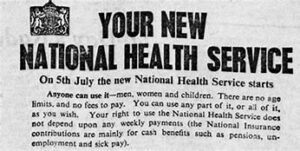
Psalm 89: 1-4, 15-18, Matthew 10: 40-end
Whoever welcomes you welcomes me, and whoever welcomes me welcomes the one who sent me.’ Matthew 10:40.
Coincidentally, right now we are commemorating both the seventy- five years since the arrival of the HMT Empire Windrush and the foundation of our National Health Service. Both events of huge significance in our national life.
The Windrush generation, as they have come to be know, came here at our invitation to help rebuild the war- ravaged nation, the ‘Mother Country’, after all the devastating and destructive years of the Second World War. A war in which many Afro-Caribbeans came willingly to fight alongside us in defence of the freedoms mutually held dear. Freedoms which included that of freedom from racial or ethnic persecution; the sort of persecution that had led to the deaths of millions in the Nazi death camps. Not just Jews but Gipsies, homosexuals, those with learning difficulties; indeed, any category that Nazi Germany considered unwelcome in the new world they dreamed of creating; creating a nation with a new social order conforming to the Aryan/Nordic ideal full of white-skinned, perfectly-formed, flaxen-haired, blue-eyed people no matter that Hitler himself, together with many of his leading henchmen failed to conform to this ideal.
Those first seven thousand West Indian passengers who landed at Tilbury all with royal coat of arms embossed navy blue passports who may have been welcomed when they came here to fight alongside our British troops, shedding their blood, giving their lives came with such high expectations and yet found suddenly they were not in the least welcomed. They were the wrong colour for landladies to give then rooms in which to live. They were the wrong colour to do anything but the most menial but essential jobs and even then, they experienced outspoken prejudice and overt and often cruel discrimination.
 And, ironically, many found work within the newly established NHS and to this day many Afro Caribbeans still work in that sector and goodness knows what we would do without them and all those who have come from abroad to care for us when we are sick both within the NHS itself and within the care sector.
And, ironically, many found work within the newly established NHS and to this day many Afro Caribbeans still work in that sector and goodness knows what we would do without them and all those who have come from abroad to care for us when we are sick both within the NHS itself and within the care sector.
In contrast to our failure to give a proper welcome to those landing from HMT Empire Windrush and subsequent passengers from similar boats the creation of the NHS was welcomed with jubilation. Here the nation could boast the creation of the world’s first entirely-free health service for all who needed it. No longer was it the size of your purse or bank account which determined whether or not you could afford to seek treatment. Whether you were a direct descendant of the Norman invaders or a newly arrived immigrant from Jamaica you were equally entitled to treatment; This was an initiative that met with just about everyone’s approval.
So these two historic events saw very contrasting levels of welcome. Welcome a word which I find every time I log into my laptop. Welcome a word I use at the start of every service at which I officiate but strangely I realised not a word I can recall ever using when a visitor comes to my house. Then it is far more likely to be simple ‘Hello, do come in.’ And researching the origins of the word I discovered to my surprise that it does not actually mean in effect ‘Well come’ similar to the meaning of the French ‘bien venue’ but comes from an Old English word wilcuma where wil can mean pleasure and cuma means guest. So in saying welcome to someone you are in effect telling them they are a pleasant guest.
![]() In today’s gospel reading the emphasis is all on welcome; welcomes given and welcomes received. Welcomes that reveal the living Christ, the living God and here I am reminded of the Rublev icon of the three seated figures around the table with a space in front of them. A space which many have suggested is the space into which we are invited and welcomed into the company of that Trinity. Henri Nouwen wrote: ‘As we place ourselves in front of the icon in prayer, we come to experience a gentle invitation to participate in the intimate conversation that is taking place among the three divine angels and to join them around the table. The movement from the Father toward the Son and the movement of both Son and Spirit toward the Father become a movement in which the one who prays is lifted up and held secur
In today’s gospel reading the emphasis is all on welcome; welcomes given and welcomes received. Welcomes that reveal the living Christ, the living God and here I am reminded of the Rublev icon of the three seated figures around the table with a space in front of them. A space which many have suggested is the space into which we are invited and welcomed into the company of that Trinity. Henri Nouwen wrote: ‘As we place ourselves in front of the icon in prayer, we come to experience a gentle invitation to participate in the intimate conversation that is taking place among the three divine angels and to join them around the table. The movement from the Father toward the Son and the movement of both Son and Spirit toward the Father become a movement in which the one who prays is lifted up and held secur
We come to see with our inner eyes that all engagements in this world can bear fruit only when they take place within this divine circle… the house of perfect love (Behold the Beauty of the Lord: Praying with Icons, p. 20-22).
Words which surely concentrate our mind not just on our receiving a welcome from Father, Son and Holy Spirit but just as importantly challenge us to embracing all whom we meet in a similar welcome of loving security. Such a welcome was given to very few of those who disembarked from the Windrush and similar boats. Such a welcome is rarely being given to all those who because of war, displacement, persecution, and famine struggle to reach our shores seeking some sort of security, some sort of future for themselves and their families. And here perhaps it should be recognised that throughout God’s world the figures for the end of 2022 that it is a global crisis with over one hundred million displaced people of whom over thirty-five thousand were refugees and over sixty million internally displaced. These are shocking figures and speak of a world in turmoil because of war, persecution, natural disasters and climate change. Of course, we cannot here in Britain welcome them all but without becoming too political maybe we should at least try to welcome those who come to our shores seeking refuge with a lot more understanding of what has driven them here and a sincere compassion for their plight. They are not just unwanted commodities which can be passed onto somewhere else just as we have passed on so much of our discarded plastic for other countries to deal with. We saw such a response at the outbreak of the Ukrainian war and it was noticeable that many who responded to the need for homes for the refuges who came were Christians.
I do not pretend that the problems of refugee and asylum seekers coming here is an easy one, but I do believe that as a country that is still at least nominally Christian we need to recognise that each and every one of these people is as welcomed to be a guest seated at that fourth space in Rublev’s icon as we are and treated with respect and empathy. A welcome which reflects that given to the newly created NHS; not a welcome that repeats the lack of hospitality shown to the Windrush generation by so many. The Bishop of Chelmsford, Guli Francis-Dehqani, herself a refugee from Iran as a twelve year old, writes this: ‘Whoever you are, wherever you come from, whatever your story, there is a common identity that binds us all as children of God, each uniquely made in the divine image and loved as part of the glorious diversity of creation.’ Such words surely urge us to be prepared always to be ready to give a welcome to all whom we encounter for like us they are guests on God’s earth. And in so doing remember too the words of St Paul: ‘So then you are no longer strangers and foreigners, but fellow citizens with the saints, and members of God’s household.’ (Ephesians 2:19) I pray that in making our welcomes genuine we may discover the warmth of new friendships and more importantly a sense of the divine love in which we are all held as beloved guests of God himself.
Abinger Common, Surrey RH5 6HZ ///delay.trials.plans
Tel: 01306 737160


Data Protection & Privacy
We do not track any browsing activity on this website.
We may sometimes link to external sites and social media but are not responsible for the content of these websites and you should refer to their individual privacy and cookies policies.
If you are included in an event photo and do not wish to be please contact us and we will remove – Contact Us

If you would like to apply for a Login account to help update this site, please email the web team here.